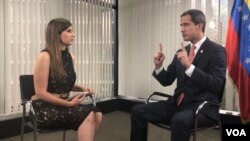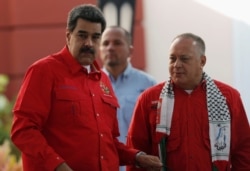Updated 12:45am, Aug. 21
U.S. President Donald Trump and Venezuelan President Nicolas Maduro each said Tuesday that members of the Trump administration have engaged in dialogue with officials from Maduro's government.
Responding to reporters' questions at the White House, Trump did not identify the Venezuelan officials involved, saying only "we are talking at a very high level" and to "various representatives of Venezuela."
Maduro also did not give any names involved when he spoke later in a televised address. He said the talks had been going on "for months."
Opposition leader and U.S.-recognized interim Venezuelan leader Juan Guaidó told VOA Spanish that members of Maduro's inner circle reaching out to U.S. officials are trying to "save themselves."
"It seems that each one is looking to be saved, when what we want is to save Venezuela." Guaidó told VOA, adding that "there is no coordination" within those loyal to Maduro.
The Associated Press reported that the United States initiated secret communications with Diosdado Cabello, the president of Venezuela's National Constituent Assembly. The AP report said Maduro loyalists were trying to obtain guarantees that they would not suffer reprisals if they leave power.
Cabello later dismissed the report as a "lie and a manipulation." During a Caracas news conference he sarcastically responded to a question about the AP report by saying "it's supposed to be a secret and (as such) I cannot say anything."
Guaidó told VOA he is aware that some of Maduro's representatives are in the United States. He did not elaborate but did say the visit is " an initiative (led by) the government in charge."
The Washington Post and other U.S. media outlets reported this week that Maduro delegates had offered the possibility of holding presidential elections before the talks between Venezuela's opposition and the Maduro government held in Barbados were suspended. The talks aimed to resolve the political impasse.
Asked whether he would be willing to participate in a presidential election with Maduro, Guaidó said "it would be very difficult to go to a free and democratic election with a usurper."
"We are not going to play that game," Guaidó said.
He told VOA he would be willing to lift the U.S. sanctions imposed on Venezuelan government officials if the Maduro loyalists committed to backing his leadership claim.
Guaidó declared himself Venezuelan leader in January, using his constitutional authority as the National Assembly president to declare Maduro's re-election last year illegitimate because of fraud. The United States and dozens of other countries have recognized him as interim president.
Russia, China, Iran and Cuba still support Maduro.





